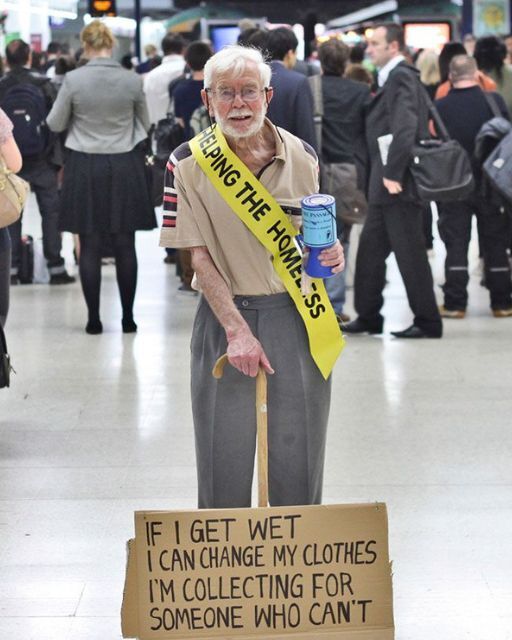The first time I saw him was on a Monday.
It was your typical morning rush at the station—people juggling briefcases, spilling coffee, all moving fast like time itself owed them something. But in the middle of all that chaos, he stood still.
Leaning on a weathered cane, with a yellow sash across his chest that read HELPING THE HOMELESS, he held a donation tin in one hand—and wore a quiet smile like it was armor.
At his feet sat a cardboard sign:
“IF I GET WET I CAN CHANGE MY CLOTHES. I’M COLLECTING FOR SOMEONE WHO CAN’T.”
I paused. Not for long—just long enough to read it again. It was so simple, so raw, it hit harder than any polished charity ad I’d ever seen.
He never begged. Didn’t shake the tin or call anyone over. Just stood there, calm, as if he’d made peace with being ignored—but still showed up anyway.
The next day, he was there again.
And the next.
Eventually, I brought him a cup of tea. Nothing special. Just something to warm his hands. We barely spoke. But one morning, when the station was quieter, I asked why he did it—why not stay home and rest?
He lightly tapped the tin and said, “Because she couldn’t.”
I didn’t ask who she was. I didn’t need to.
But soon after, a photo appeared on the side of his tin.
A young woman, smiling wide, wrapped in a blanket on what looked like a station bench. And beneath it, in shaky handwriting:
“My daughter. Before the streets.”
Everything changed in that moment. It wasn’t just about the cause anymore—it had a face, a name, a story. Her name was Lily, he told me eventually. A vibrant soul, a talented painter with laughter that filled every room. Life had knocked her down—a chain of bad breaks, addiction, and homelessness.
His name was Tobias. And every day he stood there, rain or shine, was a day he clung to hope. That she’d come back. That she’d be safe.
Weeks became months. I brought him more than tea. A scarf, sometimes lunch. Kind words when the day felt heavy. Others noticed too. The tin filled faster. People paused. Listened. Tobias became a quiet symbol of persistence and love.
One freezing morning, he was visibly weak. I urged him to go to the hospital. He resisted. “I can’t leave. Not while she’s still out there.”
He finally agreed—only after I promised to take his spot.
Standing in that station with his tin, I understood something: it wasn’t just about money. It was about presence. About not giving up.
At the hospital, he showed me a sketchbook full of Lily’s art—so full of life and color, it almost hurt. “She had a gift,” he whispered. “But the streets… they take everything.”
Tobias returned a few days later, frailer but more determined than ever. Only this time, something shifted. The community began rallying. Shops donated items. A local church offered rest space. Volunteers joined his quiet mission to find Lily.
And then—one gray, rainy afternoon—it happened.
A young woman approached. Thin. Worn clothes. But her eyes—those were Lily’s.
Tobias lit up like sunrise. He called her name, and she ran into his arms. There were tears. Apologies. Long-overdue embraces.
She was alive. Scarred, but alive.
Inspired by his love—and the kindness around her—Lily chose rehab. She started painting again, guided by a local art mentor. Her work carried the weight of everything she’d been through. And people noticed. Her paintings sold. Her smile returned.
Tobias, with the help of commuters who once passed him by, started a small nonprofit—helping others like Lily find support and resources. He no longer stood in the cold every morning; now, he spoke at events. Shared his story. Built bridges.
And Lily? She painted a mural at the station. A bright, bold tribute to hope, filled with color and defiance—a reminder that even broken things can bloom again.
Tobias and Lily became something bigger than a father and daughter. They became proof.
Proof that love doesn’t quit. That kindness matters. That the smallest act—like pausing to notice someone—can spark a chain reaction.
So here’s what I learned:
Never underestimate the power of showing up.
Hope may flicker, but it never dies unless we let it.
And above all, love—real love—is stubborn. It fights. And sometimes, it wins.
If this story touched you, share it. Someone out there might need that spark today.
